During its 2017 Remembrance Day observance, in Hamilton, Ontario, the Canadian Warplane Heritage Museum invited author and historian Ted Barris to speak about the year’s most talked-about, military historical milestone – the centennial of the Battle of Vimy Ridge. Following the talk/presentation also broadcast on television, he received this note:
“Thank you for such an amazing presentation today,” Jan Jarrett wrote. “I particularly liked your ability to make the battle at Vimy relevant to a new generation … encouraging them to see youthful faces in uniform.”
Writing military history was not Ted Barris’s first choice. Like most writers, he began his writing career in search of stories, and, like his father (Alex Barris) before him, has established a solid reputation for getting the facts straight and telling the history well.
Born in Toronto in 1949, Ted knew in grade school he wanted to become a writer. Coincidentally, it was during his research for a term paper – The Causes of the War of 1812 – and at the urging of an inspirational elementary school teacher (Mike Malott) that he fell in love with history and historical writing. The practical side of writing hit him early, however, because while attending high school, he earned spending money by contributing stories on high school activities to the neighbourhood weekly, the Agincourt Mirror.
In 1968, Barris entered Ryerson Polytechnical Institute’s three-year Radio and Television Arts program. Again, he used his newfound skills to land part-time work hosting the weekend all-night show at CJRT FM and occasionally reading news on CBC Radio. He also explored documentary, for the first time, co-writing and co-producing half a dozen radio docs for CBC Radio’s weekend youth program, Action Set, hosted by Al Maitland and John Kastner. Though he graduated with an RPI diploma, he eventually returned to his studies, made up the credits required and received his Bachelor of Applied Arts from Ryerson University in 1976 (receiving his degree at the same graduation as his wife Jayne MacAulay – they had married in 1975).
Drawn initially to journalism associated with entertainment coverage, in the early 1970s Barris wrote freelance music reviews for the Globe and Mail, and a number of Canadian show-business magazines such as Wingit, Pop and Grapevine; he also had longer features published in such Canadian periodicals as Canadian Composer and RPM Magazine as well as American magazines Rolling Stone (San Francisco), Film News (New York) and Country Sky (Los Angeles). This writing put him in line for a staff position with Warner Bros. Records in the company’s artist and repertoire department, but instead he moved west to work in radio and television. For two years he worked on staff at the University of Saskatchewan, writing, directing and editing educational TV. One short film he wrote and directed – a public service message about noise pollution – won the White Owl Conservation Award (Montreal) in 1973.
While residing in Saskatoon, Barris discovered data about the earliest days of steam navigation on western Canada’s major waterways; he learned that there were first-hand witnesses, diaries and files in local archives brimming with similar material; so he set about tracking down the sources for a potential manuscript. On receipt of a Canada Council grant in 1974, he began researching, interviewing and writing his first book – Fire Canoe: Prairie Steamboat Days Revisited (McClelland and Stewart, 1977). The book was technically a bestseller, but enjoyed sales principally in western Canada. The book gained additional attention when the federal government decided to recognize western Canadian steamers with a series of commemorative postage stamps.
In 1978, Barris took up freelancing fulltime – as a journalist and broadcaster – moving back and forth across the country as work demanded. In print, he was published in both national and regional press, while on-air he contributed to numerous CBC Radio programs (including Morningside, Arts National, Sound of Sports) and to National Public Radio (Washington, D.C.). He also story-produced for several shows on TV Ontario during this time and wrote a syndicated TV pilot, Whatever Happened To…? about historic figures, events and phenomena. His documentary work was again recognized in 1978, when his conversations with witnesses in The Sinking of the Titanic aired on CKO, earned him the International Billboard Radio Documentary Award (New York).
Taking up residence in Edmonton in 1979, Barris returned to his writing of history as a focus for much of his freelance work and income. He wrote scripts for the Alberta Educational Communications Authority (ACCESS), including documentaries on Aboriginal and Metis life, as well as a series of history documentaries called The Alberta Experience, which celebrated the province’s 75th anniversary year. His scripting on the CBC TV show Tommy Banks Live helped earn the show a CBC TV Prix Anik Award (1981); he was an ACTRA Award finalist (1979) for scripting the variety special A Little Part of Canada (co-written with his father, Alex Barris); and his script for the NFB documentary Elk Island: Prairie Sanctuary won the 1985 Golden Sheaf award at the Yorkton Film Festival. In that ten-year period in Alberta, as well, he served as regional president of the Alberta branch of the ACTRA Writers’ Guild.
Again he contributed regularly to periodicals in the region, including book reviews for Western Report, and features for Edmonton Magazine and Western Living. During his stay in Edmonton he also wrote his next three books – Positive Power: The Story of the Edmonton Oilers Hockey Club (ESP, 1983); Rodeo Cowboys, the Last Heroes (Prairie Books, 1985); and Spirit of the West (Key Porter, 1987). When Hurtig Publishers began preparing entries for its new Canadian Encyclopedia (1985), Barris was invited to write several history entries ranging from sport to navigation to wartime material.
Using Toronto as his base again in the late 1980s, Barris began writing a syndicated weekly column, called The Barris Beat (it is now in its 16th year) and he freelanced on-air principally for CBC Radio (as backup host for such programs as Metro Morning, Ontario Morning, Radio Noon, etc.) He began writing for Facts and Arguments in the Globe and Mail and when the National Post came on the scene in the 1990s, he wrote features for its Issues and Ideas section. He also moved to feature writing for such national periodicals as 50Plus magazine and Masthead magazine. And his features focusing on Canadian military history began appearing in Legion magazine, the Canadian Aviation Historical Society Journal, Airforce magazine and Esprit de Corps.
Documentary radio and periodical writing about Canadian military history led to longer manuscripts and the first of his military books – Behind the Glory: The Plan that Won the Allied Air War (Macmillan, 1992); Days of Victory: Canadians Remember 1939-1945 co-authored with his father, Alex Barris (Macmillan, 1995); and Deadlock in Korea: Canadians at War 1950-1953 (Macmillan, 1999). All were bestsellers in hardback and paperback. Macmillan also published his book Playing Overtime: A Celebration of Oldtimers Hockey (1995).
As a spin-off of his military writing, Barris was invited to join the roster of speakers travelling the country as a guest speaker for the Association of Canadian Clubs. Numerous veterans’ organizations, regimental associations and military museums across the country called upon him for keynote speeches, A/V presentations and Remembrance Day dinners. For instance, he was headline speaker at the Allied Air Forces Reunion (Toronto, 1993), the Billy Bishop Museum commemoration (Owen Sound, Ont., 1994), the 50th anniversary observance of the British Commonwealth Air Training Plan (Yorkton, Sask., 1995), the Lancaster Museum Reunion (Nanton, Alta., 1996), as well as regular “history night” speaker at the Royal Canadian Military Institute in Toronto.
In 1993, Ted Barris received the Canada 125 medal “for service to Canada and community.” In recognition of his work documenting the role of Canadian volunteer soldiers during the Korean War, and subsequent presentations of his manuscript material/research on behalf of veterans before the Veterans Affairs parliamentary committee, the Korean War Veterans Association of Canada awarded Barris an honorary lifetime membership in the KVA. In 2000, the University of Toronto invited Barris to submit a learned paper during a conference on Canadian/Korean perspectives in the new millennium; his research was subsequently published in book form as Canada and Korea: Perspectives 2000. He also received a citation of merit for his assistance in awareness and fund-raising for the Durham Public School Board initiative to send high school students from that region to Normandy in June 2004 and to Hong Kong in November 2005.
Academia came calling in 1999. Centennial College’s School of Communications, Media and Design (in Toronto), needed a qualified journalist and broadcaster to teach at its Centre for Creative Communications. At first Barris filled in, teaching both graduate and undergraduate students in the program’s first year. The college invited him back a second year and by 2002 he had taken a fulltime position as professor of print journalism – teaching news reporting, beat reporting, copy editing, online writing, broadcast journalism, law and ethics, and the history of broadcasting. That same year he was a finalist for Centennial College’s Wicken Teaching Excellence Award and received the NISOD Excellence Award (from the University of Texas at Austin). In addition to his teaching duties, Barris has introduced a high-profile Speakers’ Series at the college through which colleagues in the industry – Gwynne Dyer, Pamela Wallin, June Callwood, Linden McIntyre, Carol Off, Royson James, Naomi Klein, Knowlton Nash, Anna Maria Tremonti and Lloyd Robertson, among others – have spoken to Centennial students, faculty and staff. As a continued connection with those celebrated media names, Barris underwrote and introduced the June Callwood Scholarship at Centennial College, the award designed to recognize and assist (with small financial bursary) the work of aspiring communication students with a particular passion for advocacy communications. He also re-instituted Remembrance Day activities at the college; each year since 1999, the communications school has come to a full stop as invited veterans offer first-hand accounts of their wartime experiences during a full November 11 observance.
During this same period Barris completed two other books on non-military subjects. In 1999, he co-authored with Rod Austin Carved in Granite: 125 Years of Granite Club History (Macmillan); and in 2001, he co-authored with Alex Barris Making Music: Profiles from a Century of Canadian Music (Harper Collins). As a long-time member of the Writers Circle of Durham Region, Barris also spearheaded an annual celebration of authors. The “Words In Whitby” series of public interviews (a la Actors’ Studio) allowed writers and fans outside Toronto to witness hour-long conversations on stage as well as autographing sessions with their favourite authors. Over the six years of the event, Barris has interviewed at length such writers as Pierre Berton, Charlotte Gray, David Adams Richards, Wayson Choy, Nalo Hopkinson, Wayne Johnston, Robert J. Sawyer and Joy Fielding.
In 2004, his most popular Canadian history work up to that time was released by Thomas Allen Publishers, on the 60th anniversary of the D-Day invasion of Normandy. JUNO: Canadians at D-Day, June 6, 1944 was a bestseller on the day it was published and yielded a stream of media appearances, including featured guest on CBC Radio’s Sunday Edition; colour commentator (with Lloyd Robertson) on CTV’s coverage of the D-Day 60th Anniversary as well as CTV’s Canada A.M.; featured historian on TVO’s Studio 2; and keynote speaker at the Empire Club’s tribute to the D-Day anniversary (televised on Rogers Communications).
A rewritten and updated 60th Anniversary Days of Victory edition was published by Thomas Allen Publishers in 2005, as well as a republished edition of Behind the Glory: Canada’s Role in the Allied Air War, completing Barris’s trilogy of books on the Second World War. In honour of Year of the Veteran observances across Canada, he was invited (among other places) for a return visit and speaking engagement at the Empire Club of Canada in December 2005 as well as the RCMI. Recently, he has also been called upon to offer letters of support and/or endorsements for inductees to the Aviation Hall of Fame, and applicants for the Order of Ontario and the Order of Canada. He also appeared on national television in support of the campaign to keep Fred Topham’s WWII Victoria Cross medal in Canada. In March 2006 at the 78th Fraser Highlanders annual dinner, the regiment presented Ted Barris with its 2006 Bear Hackle Award of Excellence. Previously awarded to such military dignitaries and historians as Brig. Gen. Denis Whitaker, Dr. Jack Granatstein, Maj. Gen. Lewis Mackenzie and Dr. Terry Copp among others, the citation noted Barris’s “contribution to Canadian military history and efforts to preserve that Canadian tradition.”
Thomas Allen released his 15th book in time for the centennial of the battle at Vimy Ridge during the Great War. Victory At Vimy, Canada Comes of Age, April 9-12, 1917 received national coverage and accolades from most reviewers. In praise of the book, the Calgary Herald said: “through a masterful use of oral histories, personal letters and memoirs…Ted Barris has created a fitting memorial to the ordinary Canadian soldiers at Vimy. The Globe and Mail said Barris “brings back a world from beyond the horizon of living memory.” And the National Post reviewer called Victory At Vimy “ must read.” The book has remained in the top-ten on most major bestsellers lists throughout the spring of this year (2007).
Next came a more personal piece of historical non-fiction. In 2009, Thomas Allen published Barris’s 16th book. Breaking the Silence: Veterans’ Untold Stories from the Great War to Afghanistan explored the unexplorable. For the first time in book form, Barris offered insights to the nature of veterans’ wartime experiences, in a time when even the most open-minded, media-savvy and forthcoming women and men tended to resist answering the question: “What did you do in the war?” Sifting through more than 5,000 interviews in his library and reflecting hard on the nature of his encounters with veterans, Barris offered personal impressions of war – including those from his own father – that had been suppressed for years.
The year 2013 marked a breakthrough in Ted Barris’s book-writing career. That fall, he released a new story that he’d played with for more than 50 years. When Ted was a teenager, he’d recalled the thrill of seeing a Hollywood-made movie about the famous wartime tunnel escape from the Stalag Luft III prisoner-of-war camp near Zagan, Poland. Ted had actually met one of the Canadians involved The Great Escape committee, Tony Pengelly, through his son Chris. After years of story-gathering, Barris learned that the story had little or nothing to do with the likes of Steve McQueen or James Garner, or any Americans at all, but because they made up nearly a third of the POW population at Luft III, that Canadians had played a major role in the operation. His book The Great Escape: A Canadian Story became an immediate bestseller and among a number of accolades was awarded the Independent Booksellers Libris Award (shared with astronaut Chris Hadfield) as the 2014 Non-Fiction Book of the Year. Since its publication by Dundurn Press, The Great Escape has had Ted telling/presenting the story in front of audiences no fewer than 100 or 150 times each year. His feature story on The Great Escape made the shortlist for the 2014 National Magazine Awards. This was followed during the summer of 2014 by recognition from American veterans; during a speaking tour in the U.S., Barris addressed members of the U.S. Stalag Luft III POW Association, who recognized his work in the Great Escape book with a Certificate of Honor. The original certificate, awarded annually, will be archived in the U.S. Air Force Academy in Colorado.
Barris’s 18th book, in 2016, was a rerelease by Dundurn of Fire Canoe, with an expanded selection of photographs, but more importantly, a wider view of the importance of steam navigation on the Canadian prairies around the time of Confederation. In the revised work, Barris made clear the role that captains, stevedores, firemen, immigrants, soldiers, RCMP, and others aboard more than a hundred different sternwheeler or screw-propellor steamboats had in the knitting together of the loose arrangement of provinces that would expand Canada’s borders from sea to sea to sea. Fire Canoe, Barris contended, enhanced the view Canadians had of their 150 years of nationhood.
Barris’s growing library of Canadian military books and his regular public appearances to speak about Canadian military history – hundreds of presentations each year – have sparked an additional activity. Since 2004, Canadian-based Merit Travel has invited Barris to act as historical consultant and guide for veterans’ and Canadian travellers’ revisits to Second World War sites – in France, Belgium, Holland, Italy and Britain. Each tour has attracted scores of veterans, their families and history buffs alike to revisit historically significant locations as Barris offers period anecdotes and perspective of the military events that took place there.
In the spring of 2017, Barris decided to step down from his teaching role at Centennial College in Toronto. After 18 years as a professor of journalism and broadcasting, he decided to devote his full attention to work as a writer, broadcaster and public speaker. While his adminstrators at the college referred to Barris’s decision as “retirement,” Ted preferred to say, “I’m not retiring. I’m simply going back to where I came from,” as a full-time freelancer. His speaking schedule has him appearing year-round, often half a dozen times a week. His periodical writing and broadcast appearances remain a regular part of his occupation. And with HarperCollins Canada about to publish his 19th book, Dam Busters: Canadian Airmen and the Secret Raid against Nazi Germany, in the fall of 2018, Ted Barris appears as busy as ever.
In recent years, Ted Barris’s work in published print, on the air, and in public service has also earned him recognition. In 2011, he received The Minister of Veterans Affairs Commendation. Normally presented to veterans, on this particular occasion Ted was one of 19 civilians awarded the commendation. His citation read, in part: “Ted Barris has made such exemplary contributions by generously giving of himself and so both benefiting veterans and making manifest the principle that Canada’s obligation to all who have served in the cause of Peace and Freedom, must not be forgotten.”
Then, in 2012, the Air Force Association of Canada selected Ted Barris to receive Queen Elizabeth II’s Diamond Jubilee Medal. His citation reads, in part: “The medal … is a tangible way to recognize outstanding Canadians … who have built and continue to build this caring society and country through their service and achievements.”
Highlights
The Great Escape goes Audible
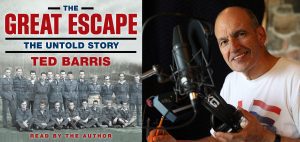 On the night of March 24, 1944, 80 Commonwealth airmen crawled through a 336-foot-long tunnel and slipped into the forest beyond the wire of Stalag Luft III, a German POW compound near Sagan, Poland. The event became known as “The Great Escape,” an intricate breakout more than a year in the making, involving 2,000 POWs. Days later, all but three of the escapees were recaptured, 50 of them were murdered by the Gestapo. The Hollywood movie in 1963 was a blockbuster hit. But not until The Great Escape: The Untold Story, by Ted Barris, did the world realize how many of the key players in the escape were Canadians. First a bestselling book in 2013, winner of the Libris Award for Canadian Non-Fiction in 2014, now an Audible audiobook, read by the author.
On the night of March 24, 1944, 80 Commonwealth airmen crawled through a 336-foot-long tunnel and slipped into the forest beyond the wire of Stalag Luft III, a German POW compound near Sagan, Poland. The event became known as “The Great Escape,” an intricate breakout more than a year in the making, involving 2,000 POWs. Days later, all but three of the escapees were recaptured, 50 of them were murdered by the Gestapo. The Hollywood movie in 1963 was a blockbuster hit. But not until The Great Escape: The Untold Story, by Ted Barris, did the world realize how many of the key players in the escape were Canadians. First a bestselling book in 2013, winner of the Libris Award for Canadian Non-Fiction in 2014, now an Audible audiobook, read by the author.
Ted Barris Award to recognize student journalism
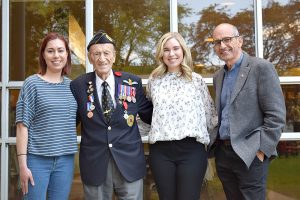
In 2017, when he retired from teaching journalism and broadcasting, Ted Barris’s colleagues at Centennial College offered him a unique retirement gift. They created an annual award to recognize excellence in student reporters’ feature stories about veterans during Remembrance week. Reporters Ellyse McGarr (left) and Ellen Samek (second from right) won praise from East York Observer editors and the inaugural Ted Barris Awards. Ellen’s feature focused on a Holocaust Week speech by Second World War veteran Martin Maxwell, who visited Centennial on May 21, 2019, the day of the award presentations.
Ted receives “Bravo Zulu” Award
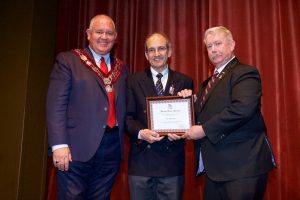 On April 4, 2017, at a ceremony hosted by Frank Scarpitti (left), mayor of Markham, Ont., Rob McTaggart (right), chairman of the 4th Canadian Mounted Rifles Association, presented its “Bravo Zulu” Award (“BZ” radio signal meaning “well done”) to Ted Barris. The citation reads: “The 4th Canadian Mounted Rifles Association is pleased to recognize Ted Barris for his outstanding contributions, over many years, in bringing Canadian military history to the public’s attention.”
On April 4, 2017, at a ceremony hosted by Frank Scarpitti (left), mayor of Markham, Ont., Rob McTaggart (right), chairman of the 4th Canadian Mounted Rifles Association, presented its “Bravo Zulu” Award (“BZ” radio signal meaning “well done”) to Ted Barris. The citation reads: “The 4th Canadian Mounted Rifles Association is pleased to recognize Ted Barris for his outstanding contributions, over many years, in bringing Canadian military history to the public’s attention.”
Ted invited to join honoured neighbourhood
 Meet “150 Neighbours,” and be inspired by the stories of those who work tirelessly to enhance community for all residents in a way that makes this uniquely Scarborough, and uniquely Canada.
Meet “150 Neighbours,” and be inspired by the stories of those who work tirelessly to enhance community for all residents in a way that makes this uniquely Scarborough, and uniquely Canada.
“150 Neighbours” is a photo-documentary series marking Canada’s sesquicentennial, celebrating local accomplishments as part of our national festivities. This social-media driven and crowd-sourced campaign has featured 150 Scarborough community and nation builders—past and present—over 150 days, from Saturday July 1st to Tuesday November 28th.
For more information about the “150 Neighbours” doc and a short feature about the invitation to join, go to: 150neighbours.ca/ted-barris.
U.S. Stalag Luft III PoW group honours Ted
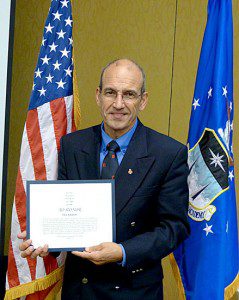 The Great Escape: A Canadian Story has received its first recognition in the United States. In late August 2014, members of the Stalag Luft III Prisoners of War Association in the U.S. presented Ted Barris with a “Certificate of Honor” for his work on publishing the historical account of the famous 1944 breakout in the Second World War.
The Great Escape: A Canadian Story has received its first recognition in the United States. In late August 2014, members of the Stalag Luft III Prisoners of War Association in the U.S. presented Ted Barris with a “Certificate of Honor” for his work on publishing the historical account of the famous 1944 breakout in the Second World War.
Ted does TEDx Talk
On May 8, 2013, Ted Barris spoke to students of St. Mary Catholic Secondary School in Durham Region (east of Toronto). The original TED Talk presentation posed the question: Why should young people reflect on war and veterans?
Commendation
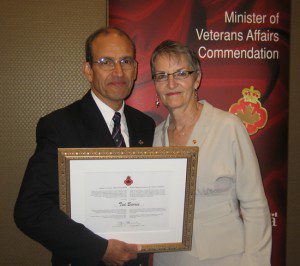
On July 27, 2011, the Minister of Veterans Affairs for Canada awarded 19 citizens his annual commendation. Traditionally, the award is “presented to those veterans … who, in an exemplary way, have contributed either to the care and well-being of veterans or to the remembrance of the sacrifices and achievements of Canadians in armed conflict.”
Most of the 2011 recipients are veterans. Ted Barris, a civilian, also received the commendation.